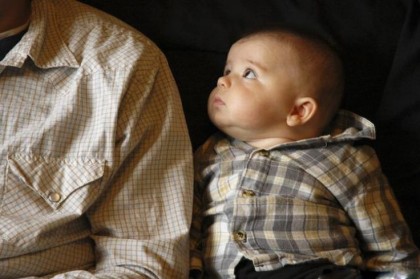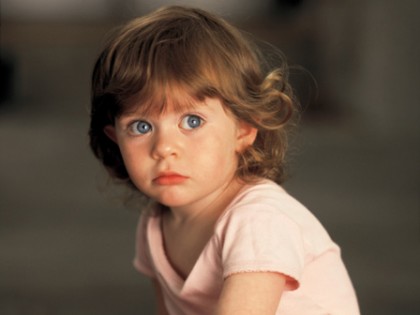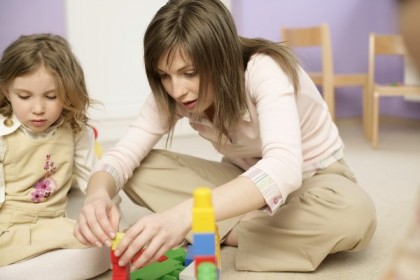Today many mothers prefer to go to work as soon as the child is 1.5 years old. After all, after this age, cash benefits for child care are no longer paid, and the husband’s salary is often not enough to provide for the family. Of course, before a mother goes to work, every family faces a problem - who should be entrusted with caring for a child. There are three ways to solve this problem: the first is to leave the child in the care of grandmothers; the second is to hire a nanny for the child and the third is to send the child to Kindergarten where there are nursery groups. Each option has its positive and negative sides, and it depends only on the parent's decision which option is best for their child.
From point of view psychologists, the art of communication with peers of the child must be taught with early childhood. The sooner he goes to kindergarten, the sooner he will learn to play in a team and become independent. Neither a grandmother, nor a nanny, and even a mother herself can replace kindergarten for a child. A kid at the age of one and a half, indeed, adapts to a new team more easily, it is much easier for him to join the children's social circle. Many children at this age are already independent, they eat themselves, go to the potty and enjoy studying the behavior of other children, while forgetting that their mother is absent.
Some children of this age they do not cry even when parting with their mother and ask them to take them to kindergarten even on weekends. , being up to three years old next to his mother, becomes "home" and it is much more difficult to accustom him to communicate with other children than babies of one and a half year old. In addition, a child at the age of three already knows how to show his emotions well and throws a real tantrum in the kindergarten when he needs to part with his mother. Most often children three years of age every morning for two or three weeks from the beginning of kindergarten, you literally have to tear yourself away from your mother.
Of course, pediatrician you will never be advised to send a one and a half year old child to kindergarten. He understands that the later the child begins to communicate with other children, the less he will suffer from various infectious diseases. Between what earlier child gets sick with chickenpox and rubella, the easier it is to tolerate the disease. It is almost impossible to get infected with "chickenpox" or "rubella" outside a children's institution. The frequency of diseases such as acute respiratory infections and colds does not directly depend on age, but on the immunity of the child. Every cold or viral disease ends with the formation of immunity, reducing the likelihood of re-infection and the development of the disease. A child who started going to kindergarten late may “not have time” to get sick with all viral infections, and therefore he will “have to make up for it” in school age. Meanwhile, missing a week of school is not the same as not going to kindergarten for a week.
Parents often associate each disease a child in a kindergarten in violation of the rules for child care - the child was sitting on a cold floor, he was dressed early, as a result of which he sweated before going outside, it was cold in the room, etc. In fact, any child cannot live in greenhouse conditions all the time; he will definitely someday have to face cold, drafts and a sharp temperature drop. Therefore, there is no need to blame the educators for the child's frequent colds, if you yourself are to blame for the fact that from birth you did not prepare the child for adaptation to kindergarten.

To give an unambiguous answer to the question: "At what age is it better to send a child to a nursery?", you need to know the character and state of health of the child well. Children who are active, physically well developed and always eager to communicate can start attending kindergarten at the age of one and a half years. But sending the child to kindergarten, the mother should not go to work on the same day. In a few weeks, the baby will most likely get sick with his first kindergarten acute respiratory disease, at which time it is very important to be able to leave the child at home, preventing the disease from progressing and not thinking about sick leave for Mom. That is why it is better to send the child to kindergarten not at the age of 3, when the mother already has to go to work, but at least 2.5 years, so that the mother has time to be with the child during illness, without having trouble at work.
Of course, desirable start attending kindergarten in the summer months. From October to April, the risk of infection increases markedly, which can greatly lengthen the time for a child to adapt to kindergarten. But in general, the adaptive period for kindergarten depends more on the nature of the child than on the weather outside. Children who grew up in families where peace and love reign, feel protected and confident in their abilities. They quickly adapt to the kindergarten. Aggressive and capricious children grow up in families where parents pay little attention to the child and are busy constantly sorting out the relationship between themselves. Of course, a child who grew up in such conditions is afraid of being left in a kindergarten without parents. After all, he has no confidence that mom or dad will definitely come in the evening to take him home.
Parents often ask the question - When is the best time to send a child to kindergarten. Time flies so fast, just yesterday, your baby learned to walk and talk, and today the crucial moment has already come - the first acquaintance with the team.
Time spent in kindergarten is a very important stage in the life of every person.
All our activities are related to communication with other people. Kindergarten, school, college, work - these skills and abilities to find their place in society will come in handy everywhere. Acquire knowledge from more experienced people, respond correctly to criticism, learn to make friends and conflict competently.
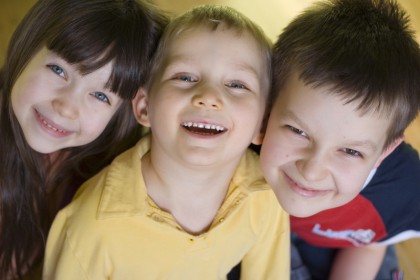
How earlier man master this difficult science, the easier it will be in the future for him to master other knowledge necessary for life. Going to kindergarten is like taking the first step towards learning the ability to communicate in a team. And the first steps are not always easy. The task of parents is to teach the child not to be afraid of acquiring these necessary skills.
If you took care of the issue of adaptation in advance and prepared the child for kindergarten, then consider that you helped him take the first half step. You can read about this in the article "How to prepare your baby for kindergarten." Now it remains to take another half step, this is to help him go through the period of adaptation. Perhaps you should think about sending your child to some kind of early development school before kindergarten. The next steps of the baby will be more confident, although you can’t do without “falls, bruises and abrasions”. This is our whole life, it is the difficulties that teach us to grow and develop. So there is no need to be afraid of them.
First you need to choose the time when to give your baby to kindergarten
The most favorable months for this: from early July to mid-August. Firstly, at this time, babies get sick less often, viruses have not yet arrived, and the body has already managed to be fed with vitamins. Secondly, all educational programs that take place in kindergartens are usually designed for the period from September to May.
The period from July to August is just what the child needs in order to "fit" into an unfamiliar environment, get to know the guys, the kindergarten regime and other new conditions for themselves. Then already in September he will be able to start mastering the educational program of the children's institution in a calmer and more confident mode.

The most unfavorable period is at the end of autumn, winter, beginning of spring. At this time, in the midst of the epidemic. It will not be easy for the child, and even these viruses, plus all the natural stresses, there will be embarrassment from the fact that he is in many ways behind the program that takes place in the kindergarten.
The first days in kindergarten, children behave differently.
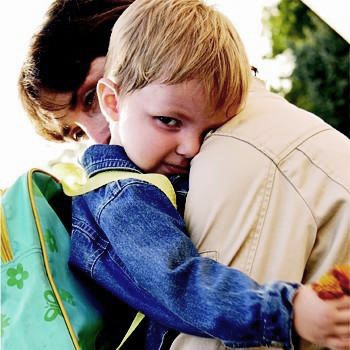 There are kids who are in a hurry to get acquainted with the new environment and the guys, to see new toys. But still, most children go through this period through tears. In some babies, the lacrimal period is very delayed. There are children who cry only when their parents see them off, and then, in the absence of loved ones, they are already calmer.
There are kids who are in a hurry to get acquainted with the new environment and the guys, to see new toys. But still, most children go through this period through tears. In some babies, the lacrimal period is very delayed. There are children who cry only when their parents see them off, and then, in the absence of loved ones, they are already calmer.
And there are babies who roar throughout the day. Such children are usually taken much earlier and the adaptation period lasts longer. Some children still cannot get used to the new environment, they often begin to get sick. It turns on defensive reaction organism. Such is the involuntary protest of the child. It largely depends on the parents how the period of adaptation of the child in kindergarten will pass.
It's normal for your baby to react negatively to new environments.
New restrictions and rules, less love and care - who will like it? The child simply does not understand - why does his mother give him to such unfavourable conditions? Therefore, the behavior of the child, even at home, can change dramatically. Aggression, tearfulness, uncontrollability, poor sleep are all a reaction to a stressful situation. It is important for parents during this period to help the child adapt to kindergarten.

In some children, even the reverse process of development can be noticed. For example, those who already knew how to dress now demand that their mothers help them or be spoon-fed, even if the child used to do it himself. There may be deterioration in speech. If before going to kindergarten you taught your child to speak correctly about objects, not to distort words, then in kindergarten he can learn the opposite, because not all children have the same level, and kids copy each other.
In a difficult period, parents should reduce homework for the child, spend as much time as possible with him in quiet activities. Watching TV at this time should be excluded. Read to him good tales, hug and kiss the child more - this will help relieve his psycho-emotional stress. You should not scold the baby for the fact that he again began to "fall into childhood", behaves worse, etc. Try to surround the baby with care and love, and then the adaptation period will pass more quickly.
How long does this difficult period take?
It depends on many factors, on the immunity of the child, his character and temperament. On average, the adaptation period lasts 1-2 months, but for some children it may be delayed for a longer period.
Preparing a child for kindergarten is not always the biggest problem for parents. Sometimes we have to face an equally difficult question - how to get to the right kindergarten. One of our club members shared her experience
The age of the baby from one to one and a half years is the worst period in order to send the child to a nursery. Any, even short-term separation from mother is a tragedy for little man. Even if a loving grandmother or a caring nanny stays with him, no one can replace his mother. Only the most extreme circumstances can explain going to nursery at this age.
Psychologists believe that sending a child to kindergarten at 1.5 years is too early. At this age, the bond between mother and baby is still very strong. The child painfully reacts both to the absence of the mother and to the approach of strangers to him.
At 2 years old, it is already a little easier for a child to get used to kindergarten. If he is active, he can eat on his own, go to the toilet, you can try to take him to the garden. In this case, it is necessary to carefully monitor the condition of the child. If the adaptation process is difficult, you should not insist on visiting the garden. Pressure on a child can negatively affect his ability to further establish contact with other people.
Children aged 3-4 years
By the age of three, the baby can already calmly endure the absence of his mother for some time. He has the necessary self-care skills, easily contacts with other children. It is this age that is most optimal for “going out”. At the age of three to four years, children begin to enjoy playing with general games, learn to share toys, gradually move to role playing distributing roles among themselves. This is an invaluable communication experience.
At this age, a very small number of children can be called "non-kindergarten". With gradual accustoming to the kindergarten group, the child adapts well in an unfamiliar environment.
In a group of children, the child will quickly learn those skills that he has not yet learned. But the main "plus" in attending a kindergarten at this age is, as already noted, the acquisition of communication skills with peers and older people.
If for some reason the child did not attend kindergarten until the age of four, there is nothing to worry about. It's not too late to send a four-year-old baby to kindergarten. It is at this time that children get full pleasure from communicating and playing with their peers.
The child will not lag behind other children in anything without attending kindergarten. One thing is important - not to close the circle of his communication with mom, dad and relatives. You can expand the area of communication with the help of various children's clubs, circles, schools of early development. It is not important at what age the child went to kindergarten. It is important how he reacts to this, how he knows how to build communication with peers and elders, how he adapts in society.
Modern society makes quite high demands on parents in terms of upbringing and education of children. If earlier the child received the first knowledge at school, now an already prepared student comes to the first grade, who can not only put syllables into words, but also read quite fluently. All this is taught now in kindergarten. So parents are worried at what age to send the child to kindergarten so that he does not lag behind his peers, but at the same time does not receive psychological trauma from parting with his mother too early.
Content:
One and a half to two years
Preschool institutions accept children for the most part with 1.5 years, however, there are those (mostly private) who are ready to take almost from birth. To nursery groups make higher demands. For example, smaller than other age groups, the number of children allows educators to pay attention to each.
And yet, psychologists agree that it is too early to send such kids to kindergarten. The fact is that at this age the attachment of the child to the mother is too strong, he needs increased attention, guardianship and care. You can see how children of this age are afraid not only to be left without a mother for several hours, but even just to lose sight of her. This period lasts up to 2.5-3 years.
Some parents tend to take their child to kindergarten earlier, justifying this by the fact that there, communicating with peers, he develops faster. Indeed, the preschool program educational institutions aims at early development, but we should not forget that up to 2.5 years old, kids do not strive for collective games. As teachers and psychologists say, they do not play together, but side by side.
The source of communication one and a half year old child more than enough, his relatives speak. It is from them that he receives information and acquires the skills necessary for his age. Therefore, if possible, it is better not to send the child to kindergarten too early.
Video: Why does a child need a kindergarten: mothers' opinions
two year olds
You can try to take your child to kindergarten for the first time at 2 years old, if necessary. It should be noted that he will get used to the team not only psychologically, but also physiologically. Being in an unfamiliar environment, being separated from your mother, communicating with many strangers is a serious stress that can lead to frequent illnesses, exacerbation of existing ones, and in more severe cases, to the emergence of new ones.
This is the so-called adaptation, and it is different for everyone. Therefore, it is necessary to prepare for visiting a preschool institution not only psychologically (introduce the teacher and the territory of the kindergarten, the future group), but also physically (harden, walk more, start taking vitamins in 1-2 months).
A good solution would be to visit a short-stay group (according to 2-3 hours per day) or developmental classes that are held 2-3 times in Week. In such classes, as a rule, the mother is present with the baby and even performs some tasks with him. The kid is gradually getting used to the fact that he can be interested even without parents, in the circle of his peers. When visiting the kindergarten, he will feel more comfortable.
If, despite all the preparation measures, the child is hard to adapt, constantly cries, nervous breakdowns, exacerbation of diseases and other unpleasant manifestations are observed, then it is better to leave him at home for another year. Excessive psychological stress threatens serious problems in the future.
Video: Psychologist's advice on the age at which a child should be taken to kindergarten
Children from 3 to 4 years old
According to psychologists, this is the optimal age when you need to send your child to kindergarten. There are a number of reasons for this:
- Age crises (2 and 3 years) are behind, the next crisis (7 years) is still far away, which means that the child is psychologically more stable, not subject to mood swings. It is easier to find a common language with a three- or four-year-old child than, for example, with a two-year-old who, by all means, strives to insist on his own.
- The child is already socially adapted, knows how to follow the rules, understands what adults require of him, and fulfills instructions.
- The child's speech is well developed, understandable and logical, others easily understand him.
- At the age of 3 years, the child needs to communicate with peers, the environment of his parents becomes small for him. He is able to play with peers for a long time, learning while playing.
- Social and everyday skills are developed: he eats independently, cleans up after himself, washes his hands, washes himself, knows how to dress and undress, and neatly fold things.
- Children after 3 years of age are able to control the physiological needs even in a dream, waking up if they want to go to the toilet.
Of course, all these skills should be instilled by parents. Some kids at 2-3 years old know how to do all of the above, others even at 5 years old have difficulty dressing. In fact, this not only facilitates the work of educators, but also makes the child's stay in preschool comfortable. He is already self-sufficient, he can do a lot himself, so he does not experience psychological discomfort.
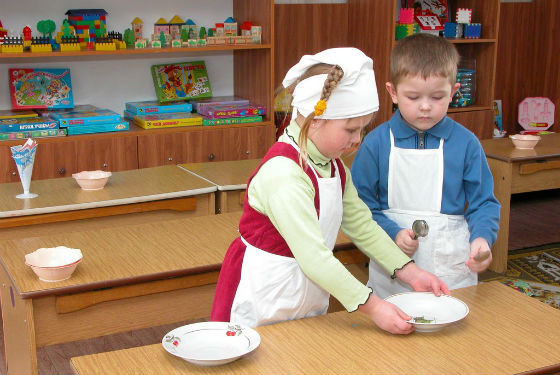
In fact, the age at which a mother should send her child to kindergarten is not as important as the presence of certain skills, indicators of the baby’s readiness to be left without parents for a long time. First of all, attention is drawn to how he builds communication with others, how he perceives the absence of his mother, how developed his social and everyday skills are.

